
Phantasy Star Online is an online role-playing game (RPG) developed by Sonic Team and published by Sega in 2000 for the Dreamcast. It was the first online RPG for game consoles; players adventure with up to three others over the internet to complete quests, collect items and fight enemies in real-time action RPG combat. The story is unrelated to previous games in the Phantasy Star series.
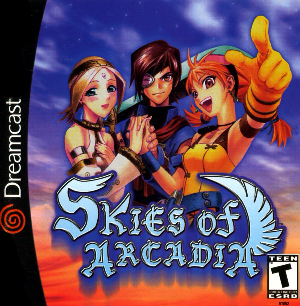
Skies of Arcadia is a 2000 role-playing video game developed by Overworks and published by Sega. Players control Vyse, a young air pirate, and his friends as they attempt to stop the Valuan Empire from reviving ancient weapons with the potential to destroy the world. The game was released for the Dreamcast in late 2000 and was ported to the GameCube in 2003.
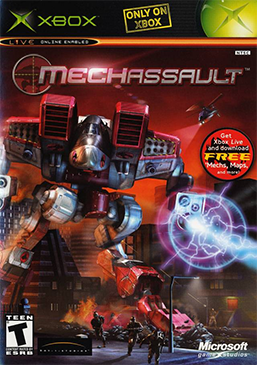
MechAssault is a video game released for the Xbox notable for being one of the first games to support Xbox Live online multiplayer. Developed by Day 1 Studios and published by Microsoft, MechAssault was initiated when Denny Thorley of Day 1 Studios approached Jon Kimmich of Microsoft about developing an original BattleTech game built from the ground up to support console play. "MechAssault" was released in November 2002. A sequel, MechAssault 2: Lone Wolf, was released on December 28, 2004. Both games are set in the BattleTech fictional universe.

Sneakers, released in Japan as Nezmix: Have A Mice Day!, is a video game developed by Media.Vision and published by Microsoft Game Studios exclusively for the Xbox in 2002. Sneakers is an action-puzzle game in which the player leads a group of mice to explore a house and its surroundings to detect enemy rats and protect their group in beat 'em up fights. Marketed as making use of 'fur shading' graphics, the design of the mice in Sneakers was intended to showcase the technical capabilities of the Xbox. The game was developed as one of two Japan-exclusive launch titles for the Xbox, and was later released in North America in an exclusive distribution with Toys R Us retail stores. Upon release in Japan, Nezmix sold poorly, with critics attributing the release to contributing to the poor launch of the console in the country. The North American version of Sneakers received generally unfavorable reviews, with criticism directed at the game's linear and repetitive gameplay.

Drake of the 99 Dragons is a third-person shooter video game developed by Swedish studio Idol FX and published by Majesco Sales. The game stars Drake, an undead assassin who is on a quest to avenge his murdered clan, the 99 Dragons, by recovering their ancient "Soul Portal Artifact" from antagonist Tang. Tang intends on using the artifact to harvest the souls of dead beings and power his undead cyborg army.
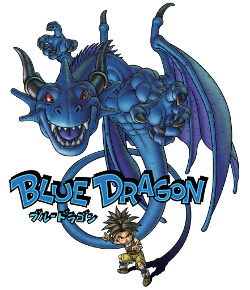
Blue Dragon is a 2006 role-playing video game developed by Mistwalker and Artoon and published by Microsoft Game Studios exclusively for the Xbox 360. Blue Dragon is based on a design by Final Fantasy series creator Hironobu Sakaguchi, who also supervised development and wrote the plot. It is both Mistwalker's debut title and the first title to be helmed by Sakaguchi outside of Square Enix.

Stranglehold is a third-person shooter video game developed by Midway Studios – Chicago and Tiger Hill Entertainment and published by Midway Games. It was released in late 2007 for Microsoft Windows, PlayStation 3 and Xbox 360. It is Midway's first game to use Unreal Engine 3. Stranglehold is a sequel to John Woo's 1992 Hong Kong action film Hard Boiled and stars Chow Yun-fat in a reprisal of his role as hard-boiled cop Inspector "Tequila" Yuen. Stranglehold is the first project on which Woo and Chow have collaborated since Hard Boiled. The game received generally positive reviews from critics and sold more than one million units worldwide.

A beat 'em up is a video game genre featuring hand-to-hand combat against a large number of opponents. Traditional beat 'em ups take place in scrolling, two-dimensional (2D) levels, while a number of modern games feature more open three-dimensional (3D) environments with yet larger numbers of enemies. The gameplay tends to follow arcade genre conventions, such as being simple to learn but difficult to master, and the combat system tends to be more highly developed than other side-scrolling action games. Two-player cooperative gameplay and multiple player characters are also hallmarks of the genre. Most of these games take place in urban settings and feature crime-fighting and revenge-based plots, though some games may employ historical, science fiction or fantasy themes.
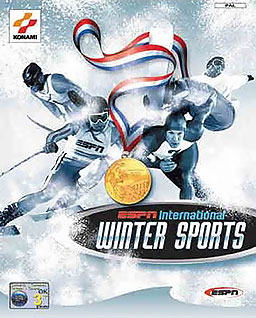
ESPN International Winter Sports 2002, known in Japan as Hyper Sports 2002 Winter, is the name of two sports video games released in 2002 by Konami, one for the PlayStation 2, Xbox, and GameCube, and the other for the Game Boy Advance. In Japan the game is part of the Hyper Sports series, known internationally as the Track & Field series.

NCAA Football 2003 is a video game of the sports genre released in 2002 by EA Tiburon. Its cover athlete is former Oregon Ducks, Detroit Lions, Miami Dolphins Atlanta Falcons, and New Orleans Saints quarterback Joey Harrington.

Smashing Drive is a racing video game developed and published by Gaelco and distributed by Namco. The game was released in arcades in 2000 and was ported to the GameCube and Xbox in 2002 by Point of View and Game Boy Advance in 2004 by DSI Games and Namco.

Top Gun: Combat Zones is a combat flight simulation game named after the 1986 film Top Gun. It was developed by British studio Digital Integration and published by Titus Interactive. It was originally released for the PlayStation 2 in 2001, followed by a GameCube version in 2002. Versions were also released for the Game Boy Advance and Microsoft Windows.
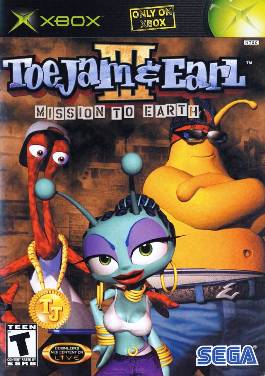
ToeJam & Earl III: Mission to Earth is an action video game released for the Xbox on October 22, 2002. Developed by ToeJam & Earl Productions and Visual Concepts, and published by Sega, it is the third installment in the ToeJam & Earl series. Players assume the role of one of three extraterrestrial protagonists: ToeJam and Earl, who starred in the series' first two games, and Latisha, a new character. While using power-ups to combat enemies, players seek to collect the twelve "Sacred Albums of Funk" and defeat the antagonistic "Anti-Funk."

Panzer Dragoon is a series of video games developed by Sega. The first three games—Panzer Dragoon (1995), Panzer Dragoon II Zwei (1996), and Panzer Dragoon Saga (1998)—were produced by Sega's Team Andromeda for the Sega Saturn. The fourth, Panzer Dragoon Orta (2002), was developed by Sega's Smilebit team for the Xbox. Spin-offs include Panzer Dragoon Mini (1996) for the handheld Game Gear in Japan. A remake of Panzer Dragoon was released in 2020.

Beach Head 2000 is a first-person shooter game developed by Digital Fusion. It was originally released by WizardWorks for Microsoft Windows and MacSoft for Mac OS as a "value-priced" release. A loose remake of the 1983 computer game Beach Head, it shared a similar premise, as players defend a beach against attack by utilizing a variety of weapons. A version of the game was also produced for video arcades by Tsunami Visual Technologies, available in various motion simulation cabinets and Digital Fusion continues to sell the Windows version as a download via its website.
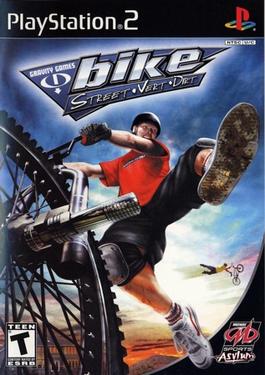
Gravity Games Bike: Street Vert Dirt is a sports video game developed and published by Midway for the PlayStation 2 and Xbox. It was released in North America on June 28, 2002 for the PlayStation 2 and on September 4, 2002 for the Xbox. It was the only game released under the Gravity Games license by Midway.

Bruce Lee: Return of the Legend is a 2003 action beat 'em up developed by Vicarious Visions for the Game Boy Advance. It was first published and released in Europe by Vivendi Universal Games on March 21, 2003, and was later published and released in North America on March 28, 2003.

MySims SkyHeroes is a video game developed by Behaviour Interactive and published by Electronic Arts. It is the sixth and final game in the MySims series. The game was released in 2010 for the Nintendo DS, PlayStation 3, Wii, and Xbox 360.

The Baconing is an action role-playing video game developed by Hothead Games. It was published by Valcon Games on the Xbox 360 and independently on all other platforms. It was released in August 2011 for PlayStation 3 via the PlayStation Network, for Mac OS X and Microsoft Windows via Steam, and for the Xbox 360 via Xbox Live Arcade. It is the third game in the DeathSpank series, and follows the character DeathSpank in his quest to defeat the AntiSpank, an evil incarnation of himself.
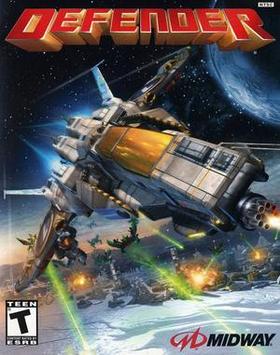
Defender is a shoot 'em up video game developed in October 2002 for the PlayStation 2, and Xbox, and was ported to the GameCube the following month, followed by a port to the mobile phone version published by THQ in 2003. The game was also rereleased for Xbox 360's Live Arcade in November 2006. It is a remake of the 1981 game of the same name. Featuring three-dimensional (3D) graphics, the game is set on multiple planets and moons within the Solar System where the player must defeat waves of invading aliens while protecting astronauts.



















